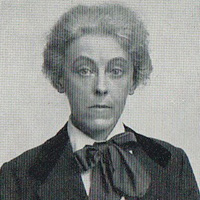The Farmer's Bride by Charlotte Mary Mew: Summary and Analysis
The Farmer's Bride by Charlotte Mew is a dramatic monologue where a husband who is a farmer by profession narrates his unhappy marital relationship with his wife. This poem ends with a sad, but a strong feeling of lust of a desperate husband.

Charlotte M. Mew (1869-1928)
The poem opens with the farmer saying that he had married a young bride three years ago who was too young that she was afraid of him and the bridal relationship. One day, even she ran away and with the help of villagers, he caught her and locked her in the attic. Since then she has started working all the household chores, but stayed too far away from the speaker, her husband. The speaker says that she loves to chat and play with the birds and rabbit, but laments that he could not get all the love and physical intimacy a husband should get from his wife.
He says that she is sweet, shy, straight, swift and young, but it does not matter anything to him because whenever she sees him, her eyes are frightened and tell him to stay away from her. The Christmas time has arrived, the farmer feels strong an urge of possessing her. The only thing between them is the stair, she is upstairs sleeping alone and he is downstairs being restless in search of her love and intimacy. His uncontrolled feeling is summed up in the following lines:
Oh! my God! the down,
The soft young down of her, the brown,
The brown of her – her eyes, her hair, her hair!
Charlotte Mew explores two kinds of unfulfilled thing in the life of the farmer. The farmer had been married three years ago; his wife has not yet turned a woman so lack of the child, is the first unfulfilled desire seen in the poem. Closely connected with this unfulfilled desire is the unfulfilled desire of sex. His wife has not turned matured, therefore he could not establish the cordial relationship with her. She sleeps in the attic, she does not come down and he does not go up. So establishing the mutual relationship has not been possible.
The poet Mew has used Colloquial rustic language as the part of the diction. So the diction contributes the theme of the poem. The language that belongs to the farmer language as the speaker says ‘us was wed’, she runned away,’ ‘twasn’t’. This kind of diction came to modernism from romanticism. There is the quest for sexual fulfillment and family happiness in the poem. Time has changed; three summers have gone. Sexual and family happiness has always been a longing for him. This happiness has just remained in his imagination. Therefore, some critics argue that Mew’s poems are about fulfillment.
In this dramatic monologue we only hear the voice of a husband, but the suppressed voice of the young wife who is not interested in the farmer is not heard at all. The use of frequent simile like ‘mouse’, ‘hare’, ‘leveret’ to compare her with the animals makes her inferior and a pet animal, and meanwhile the husband, a male member, the owner of the pet. She is made silenced and her search for the freedom from the farmer, when she ran away, was seized and was locked up in the room. The affection he shows for her in the poem seems sugar coated pills with his greedy sexual desires. The concluding lines of the poem highlights his hidden intention of urgent need of sexual fulfillment:
Oh! my God! the down, The soft young down of her, the brown, The brown of her – her eyes, her hair, her hair!
She is entrapped in her husband’s house and called it her home, which is ironic in meaning. Her ‘home’ is her place of frequent source of fear and nightmare. It is her prison and she is always kept in a vigilant watch. The poet expressed the pain of the women of her era through the silenced voice in the poem. The women were regarded as the commodities that can be bought, sold, exploited and tortured in the patriarchal society. The life and the relationship of the farmer is juxtaposed with the nature. The seasons are changing, the colors of the nature is changing and even the berries are ripening, but the relationship of the farmer with his young wife has not changed. It remained same and static which is an ironic contrast.
